
Tips & advice for car and suv tyres
In this article, you will learn to read a tyre size and its maximum load and speed and find out how the brand, range and tyre type, are shown on your tyre. You will also learn about the significance of the OE marking.
What do the numbers on tyres mean?
If you look at the sidewall of your tyre, you will notice numerous alphanumeric codes and symbols. What do those tyre markings mean?
These tyre markings give you important information about tyre usage or replacement.

How to read a tyre size?

The dimension of the tyre is defined by numbers and a letter, as shown here in yellow.
Note that these characters are sometimes accompanied by additional letters that indicate the recommended use of the tyre.
How to read a tyre width and the aspect ratio?
Example: 205 / 55
These are important tyre markings that will help you find the right tyre when you need to change it.
The first of the two numbers is the nominal section width of the tyre. It is given in millimetres and defines the distance between the inner and outer sidewall of the tyre. For example, 205 means that your tyre is nominally 205 mm wide.
The second number is the relationship between a tyre’s sidewall height and the tyre's width. It is expressed as a percentage. For example, 55 indicates that the sidewall height, between the top of the tread and the rim, is 55% of the tyre width.
How to read a tyre construction type and the wheel diameter?
Example: R 17
These tyre markings are usually composed of a letter and a number.
The letter, R, indicates that the tyre’s internal construction is Radial.
Radial technology, invented by Michelin, uses combinations of rubbers and metal and textile reinforcing materials to form very robust structures in the tread area but flexible sidewalls. It allows a longer tread life and reduces fuel consumption thanks to the reduction of the rolling resistance.
After the letter you will find a number. In our example: 17.
This number is expressed in inches and indicates the diameter of the wheel on which the tyre is designed to fit.
Such letters could be :
- P: Passenger Car
- LT: Light Truck
- C : Van commercial tyre
- XL, HL or Reinforced : Tyres with a higher load capacity than normal for their dimension. Such tyres need to be replaced by the equivalent (example : an HL tyre by another HL tyre)
- T: Temporary (spare wheels)
How to read the maximum load and speed of a tyre?
Example : 91 V
On the sidewall of your tyre you will find a number followed by a letter.
The tyre load rating or load index (in our example: 91) is a code which corresponds to a maximum load (in kg) that can be carried by a single tyre.
The tyre speed rating (in our example: V) is a code which corresponds to the maximum speed at which a tyre can carry its maximum load.

You will find a table of correspondence between these codes and their values in our article on load and speed ratings. These ratings are important information, as is tyre size, especially when considering choosing new tyres for your car.
How to identify the brand name and range of the tyre?
This is quite easy. The manufacturer's brand name is always showing on the sidewall, as is the range of the tyre.
In this picture, MICHELIN and our Michelin Man are clearly visible and the name "Pilot Sport ⁴ ˢ" refers to the range of the tyre.

How to identify the type of tyre?
The word "Tubeless" on the sidewall of your tyre indicates that your tyre does not require an inner tube. Note that a tube is sometimes necessary for certain wheels, but in such cases it is important to assess if the tube and tyre are compatible.
Conversely, the word "Tube type" indicates that the tyre requires to be fitted with a tube.
What is the benefit? A tubeless assemby is lighter, more fuel efficient and often more reliable owing to damage that can occur to the tube in service.

How to read tyre pressure?
There are markings on the sidewall of the tyre (MAXLOAD and MAX PRESS) that indicate the maximum load and the maximum pressure of the tyre. However, these are not necessarily the load and pressure values for your vehicle.
To ensure that your tyres perform correctly on your vehicle, you must refer to the inflation pressures recommended by the manufacturer of your vehicle. These can normally be found in your owner's manual or on the sticker in the driver's door or fuel filler cap.
Know more about how to check tyre pressure.

How to read a tyre date code?
The tyre date code appears in the DOT (Department Of Transportation) field, where other tyre markings are present.
The first codes are for the US market requirements. The date code appears at the end, with four numbers.
The first two numbers designate the week and the last two numbers, the year of production. In this example, the tyre date code indicates 4714, which means that the tyre was manufactured in the 47th week of the year 2014.

As for the end of the tyre's life, the only indicator is its wear. This can be measured with the help of wear indicators.
How do I know if the tyre has reached its maximum wear level?
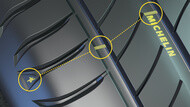
Your tyre has wear indicators.
These small 1.6 mm high ridges are present between the sculptures of the tyre.
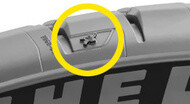
On MICHELIN tyres, you can easily identify them by the little Michelin Man symbol that appears in several places on the sidewall of the tyre. When you see the Michelin Man, you know that the wear indicators are arranged in line across the width of the tyre.
When the treads on your tyre are worn down to the same level as the wear indicators, the tyre has reached the minimum tread depth level.
For winter certified tyres (M+S and/or 3PMSF marking), the speed capacity may be lower than that of the original summer tyres. Therefore, if necessary, the vehicle speed must be limted accordingly with winter tyres fitted. In some countries, for example where the theoretical speed limit for the car may be above the speed limit of the tyres, a sticker showing this lower speed may be required inside the vehicle, clearly visible to the driver.
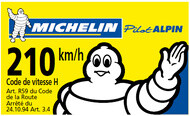
OE marking
Some car manufacturers equip vehicles with tyres tuned specifically for their requirements.
A marking on the tyre, meaning "Original Equipment", indicates that the tyre was designed by the tyre manufacturer and approved by your vehicle manufacturer to be fitted as standard.
The OE marking refers not only to the Manufacturer but often the specific car model. The differences between tyres of these types might relate to vehicle handling, comfort, noise and sometimes the requirements of the transmission and vehicle software systems. Also, the rolling resistance is optimised.

Michelin recommends that if your vehicle was originally fitted with OE marked tyres, replacement tyres should be the correct OE marked versions.
In the example image, the "AO" marking corresponds to the Audi brand, as you can see in the table below.
Table of OE markings by vehicle brand:
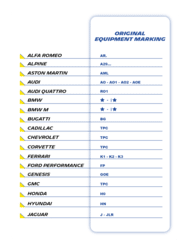
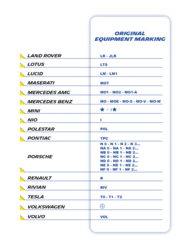
Find the perfect tyre
Enter your vehicle or tyre size
We're searching for your tire...
Wait few seconds we're processing your photo

